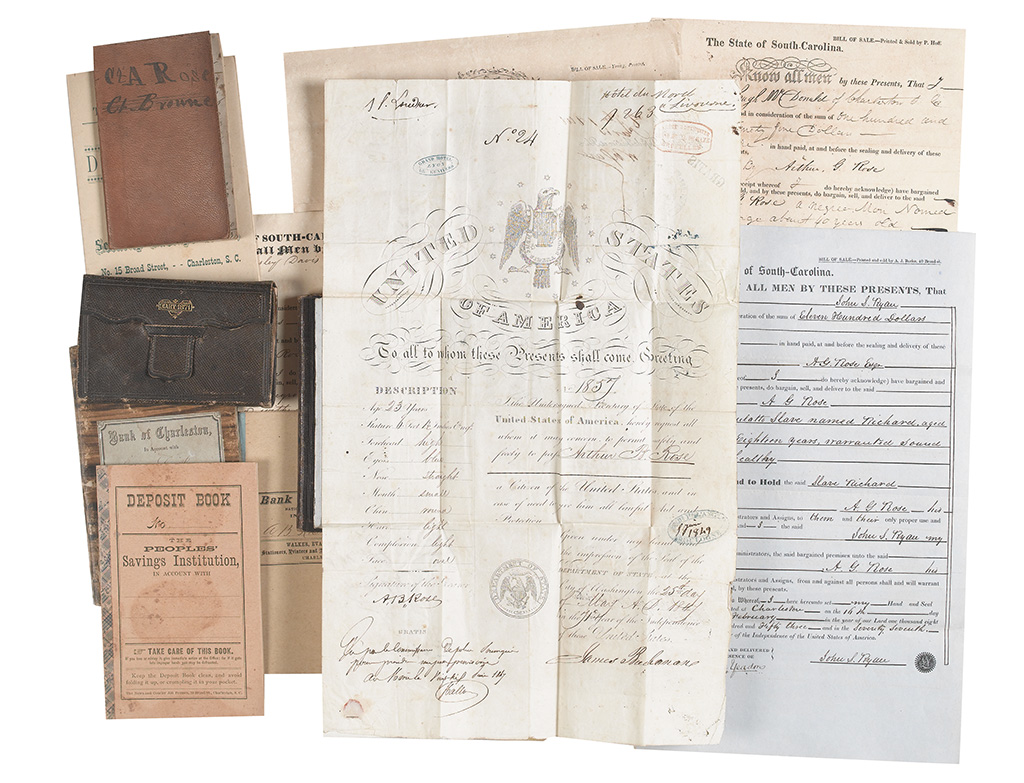Sale 2342 - Lot 23
Unsold
Estimate: $ 15,000 - $ 25,000
(SLAVERY AND ABOLITION--SOUTH CAROLINA.) ROSE, ARTHUR G., CHARLES BULOW, ET AL An archive relative to the Arthur G. Rose and Charles Bulow Plantations, of South Carolina. Includes fourteen different slave-sale documents (one of them six pages), printed and manuscript; one diary, seven bank books, stock certificate for the Florida Steam Packet Co., another for the Union Insurance Co. (1812); correspondence regarding Rose family interests as well as Bulow family interests being managed by Rose; Arthur G. Rose's 1849 passport & his sons passport from 1856. the former signed by then secretary of state james buchanan plus receipts for sales and purchases and ephemera. should be seen Vp, 1812-1890's
Additional Details
An important collection of papers dealing with the properties belonging to John Joachim Bulow under the trusteeship of Arthur G. Rose, cashier and later president of the Bank of Charleston as well as executor for the Bulow estate. The collection includes quite a lot of material relative to the holdings of Arthur G. Rose himself, his son Arthur B., and other family members. The two families were apparently connected through marriage. The papers include fourteen slave sale documents, most in the form of official printed South Carolina slave sales forms, all accomplished by hand. The earliest of these is a very large and very unusual printed South Carolina sale document dated April 9, 1822. An unusual series of six documents concern the sale of "Servant Richard." The buyer asks for a title search, which then is provided on the accompanying pages. A folio manuscript sheet, dated May 1859 through August of 1860 shows the accounting for the sale of Negroes from the Bulow plantation: specifically Hannah (the same?) and her three children, plus several large "sales of Negroes," totaling $57,827.61. A South Carolina Supreme Court report from March 1860, concerning A.G. Rose's trusteeship of the Bulow children, cites the sale of 170 Negroes. The mortgage and subsequent sale of Buck Hall and Washington plantations are two important properties that were sold under Rose's stewardship. There are a number of letters from a Mr. Francis Winthrop (another trustee) regarding the finances of the Bulow estate. One letter dated 27 Oct. 1864 acknowledges receipt of a "certificate of 15 million loan, interest and powers to satisfy mortgages of Jas. Fitzpatrick and Chas Pinckney came safely to hand." There is more from Mr. Winthrop regarding the Bulow estate during the Civil War. Apparently a great deal of money was invested in Confederate bonds. One bank book for Arthur G. Rose from the Bank of Charleston reflects the wealth of the Rose family in the 1850's with considerable sums of money being accumulated. A ledger marked "Dividends" shows how each family member owned stock in the Bank of Charleston, Macon and Western Railroad and other investments. During the late 1840's and through the 1850's, the Roses, father and son did a great deal of traveling abroad. This is reflected in the two passports from 1849 and 1856. One signed by James Buchanan, then Secretary of State. Both are elaborate documents bearing official stamps from Paris, London, Rome, Strasburg etc. and give an idea of the business that the Roses were conducting in Great Britain and the Continent. There are a number of bank books for members of the Rose family and one book marked "Bills and Receipts" covers Arthur G., Amelia, A. B. Rose Anna and Margaret Rose. The fall of the Confederacy and Reconstruction can be seen in the dwindling fortunes of the Rose family, with the mortgaging and sale of family properties in the 1880's through the turn of the century. A small pocket diary from 1871 suggests that the elder Rose had moved to New York and was doing business from there. There are a number of later documents, tax receipts etc from the 1880's and 1890's that would indicate that the Rose family was still in the Charleston area and doing business. A document, dated Jan. 15, 1890 leases a piece of Rose property for the purpose of making turpentine. Other documents are for rentals to farmers etc. A rare and fascinating collection of papers spanning nearly a century; an excellent primary resource.

Exhibition Hours
Exhibition Hours
Aliquam vulputate ornare congue. Vestibulum maximus, libero in placerat faucibus, risus nisl molestie massa, ut maximus metus lectus vel lorem.


